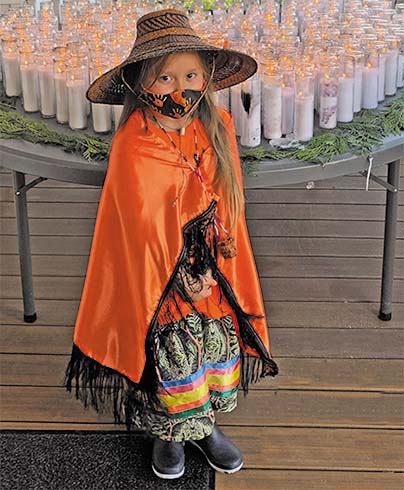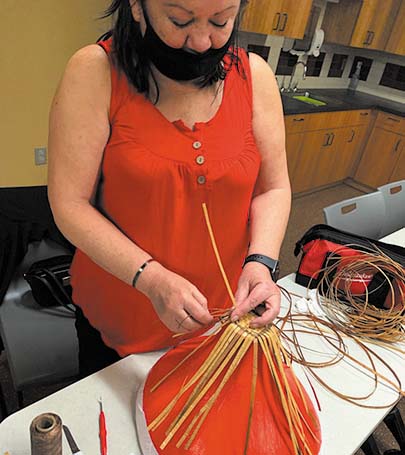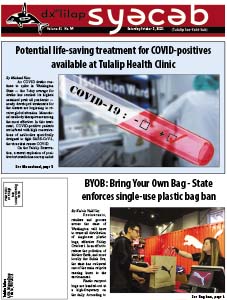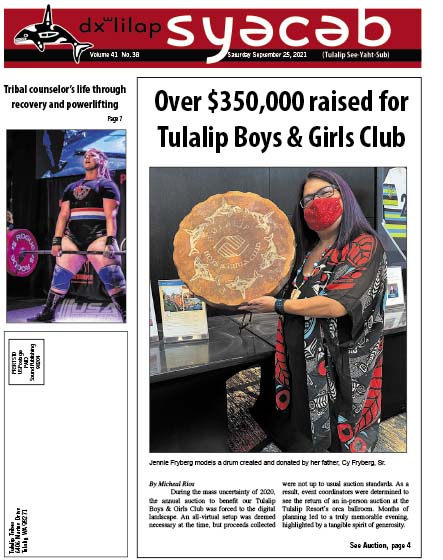
Author: Kim Kalliber
Tulalip Tribes declares September 30th as Orange Shirt Day
Remembering the lost lives of Indian residential boarding schools
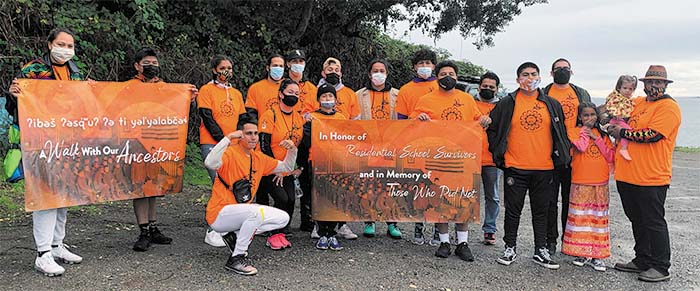
By Shaelyn Hood, Tulalip News
With the recent discovery of over 6,000 Indigenous unmarked graves, the world is finally paying closer attention to the history of Indian Residential Schools in Canada and the US, and the many innocent lives that were lost.
During the 19th to mid-20th century, Canada, the United States of America, and various Christian missionaries established Indian Residential Schools. This system was created to “civilize” and assimilate Indigenous youth to a more European-American culture. Often, tribal members were not willing to submit to these efforts, and schools started forcibly removing children from their homes. Along with major efforts to disintegrate Native American spirituality, and overall culture, Indigenous people had their hair violently cut off, were punished for speaking their language, using their tribal names, and forced to wear European-American style uniforms. Indigenous youth underwent decades of abuse, and often lost their lives.
Canada became the first to acknowledge and mark its first official National Day for Truth and Reconciliation on September 30th. However, even though the history of residential schools were just as prominent in the US, they have yet to follow suit, and acknowledge the years of dismemberment of Native American tribes.
Tulalip Tribes passed a resolution and decided to move forward, declaring Orange Shirt Day – A day of Awareness & Remembrance for Residential Boarding Schools. On September 30th, 2021, the Tulalip Tribes Education Division put on the first annual Orange Shirt Day.
Jessica Bustad, Executive Director of Education, spoke about what this day meant to her and what she was hoping to accomplish, “This day means the start of something bigger, the start of healing for our community, for our people, for Indigenous people across North America, Canada, and everyone who has experienced residential boarding schools, colonialism, and genocide.”
“It’s kind of overwhelming. I couldn’t talk about the event for a while without crying,” she contiunued. “I don’t feel like we were really the ones to put out this event. The event was already laid out by our ancestors, and we are just here to do the footwork for them. But this is long overdue, and it’s time to start bringing out the truth of what happened here so we can start to get to that place of healing as a community.”
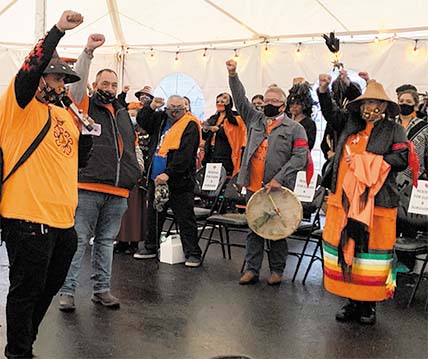
The night’s festivities started with a youth prayer and run, that began at Mission Beach and ended 1.7 miles away, at the Dining Hall. As many tribal members know, the Dining Hall holds the last remaining remnants of a residential school located on Tulalip. Kaiser Moses who was one of the participating runners, and the elected chairperson of the Senior Tulalip Youth Council, said, “Even though I was never in a boarding school and my parents weren’t in a boarding school, it still has impacts on our elders and our current generation. When I run, I run to clear my mind, to get things off my chest, and to leave things behind me. So, when I was running, I was thinking about that.”
Once the runners made it to the Dining Hall, Tribal members gathered, and discussed the evening, while looking over old photographs of their ancestors in the boarding schools, and the candles that represented their lost lives. Orange Shirts and meal boxes were also distributed to everyone that attended.
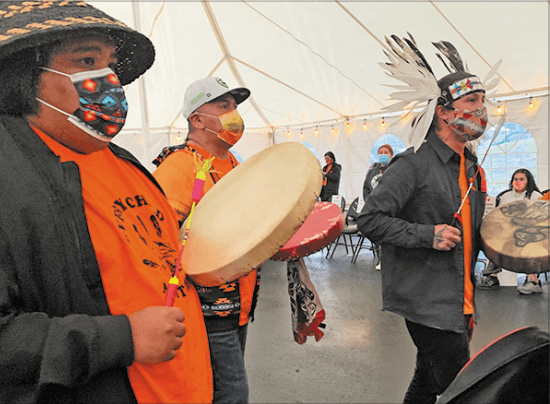
Natosha Gobin and the Lushootsheed youth – otherwise known as the Language Warriors, performed an opening prayer. It was an amazing way to commemorate the language Native Americans fought so hard to keep alive.
Following, opening words came from members of the Board of Directors. They all spoke of the grief they were feeling and the pain they know our tribe and many others were going through. Tulalip Tribes Chairwoman, Teri Gobin, shared how her father was a member of the schools and hospitals, “The historical trauma lives on, you could see it in my dad.” She sympathized with other tribal members feeling that same pain, and expressed how it deserves to be recognized. “I’m glad that we’re looking at legislation that’s going to be coming forward, that’s going to help do the investigation and find out what happened to our loved ones and to bring them back to their families and to their homelands. But it just touches me. We haven’t gotten the apologies from the government like they did in Canada. We haven’t got them from the churches on what they did to our people.”
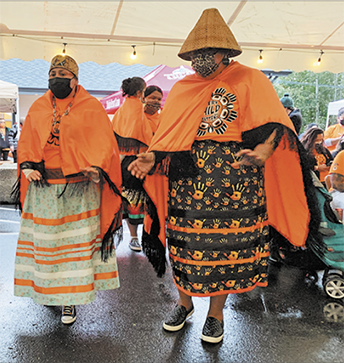
On September 24, 2021, Canadian Catholic bishops released a public apology for residential schools. The Native Women’s Association of Canada called upon the Premiers of all provinces and territories to recognize the National Day for Truth and Reconciliation. Marysville School District, which holds a lot of native children, also released a proclamation to observe “Orange Shirt Day” in remembering the children who died in the Residential Boarding School System.
Youth and Family Enrichment Manager, Josh Fryberg, followed with, “Tribes need to follow and do the same thing. Pass this resolution to honor our survivors, to honor our kids that never made it home. To create that healing the best way possible for the future generations”.
After hearing from the attending Board of Directors, the night continued with various traditional tribal prayers, drums, songs, and dances. Tribal members spoke of this opportunity, and how our ancestors didn’t have that same privilege during the days of residential schools. One of the songs was a Snohomish War Song, where the elders were sat in the middle, and performers danced around them and sang to protect them. Tony Hatch spoke of his gratefulness that the elders had joined the event, and reminded them that if anyone has any scars, all of Tulalip is here for them, and behind them.
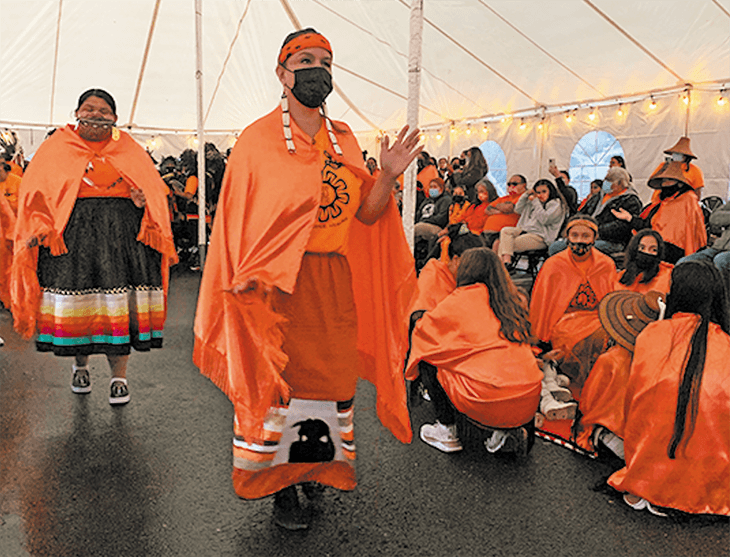
After hearing from the attending Board of Directors, the night continued with various traditional tribal prayers, drums, songs, and dances. Tribal members spoke of this opportunity, and how our ancestors didn’t have that same privilege during the days of residential schools. One of the songs was a Snohomish War Song, where the elders were sat in the middle, and performers danced around them and sang to protect them. Tony Hatch spoke of his gratefulness that the elders had joined the event, and reminded them that if anyone has any scars, all of Tulalip is here for them, and behind them.
Though many tribal elders were not able to make it to the event, others that were in attendance were given the opportunity to speak to the tribal community. Some passed along stories of loved ones that were affected, some expressed gratefulness towards our leaders, and others shared wisdom from their experiences, and what they want for the community. Overall, each speaker spoke of the pain that they felt for our community and the hopes for the future.
Ray Fryberg was one of the speakers. He told stories of how our culture has been mistreated by outsiders through the years and how we can once again become whole. “Teaching language and being able to teach things in our culture that they took away from us, those are the things that are going to heal us. The things that we lost. These are the things that we regain, and that help build self-respect through self-identity, and our own cultural values and our own cultural teachings. To be good to one another. Culture means, how do we take care of each other? One person at a time, that makes up the tribe, and that’s how we move forward. Taking care of ourselves and exercising our sovereignty”.
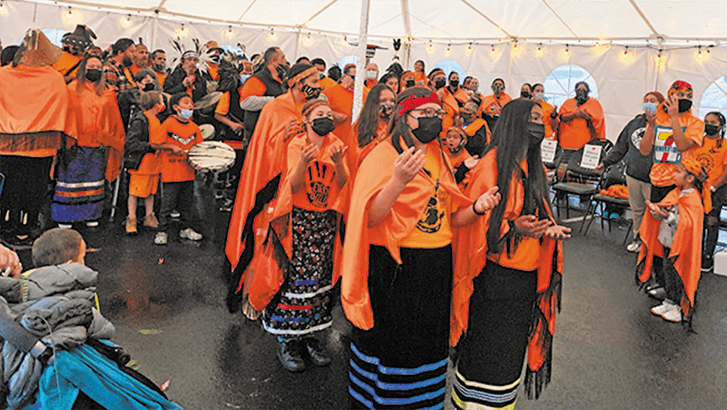
The event paid a special tribute to Tulalip, Native American Activist, Deborah Parker. She was a speaker that was unfortunately not able to make it that night. Members spoke highly of her efforts to working towards legislative reform. They spoke of the platform she has made for Native American voices and how she has become a strong representative of Tulalip Tribes. Many were praying for her and were grateful for her tireless endeavors to lift Native culture.
Towards the end of the night, the community heard from two residential boarding school survivors. Each shared the horrors of what the schools and hospitals held. They also talked about how it affected them mentally for the years following, and the demons that haunted them in adulthood.
Wayne Williams was one of these survivors. He talked about the irony of the title, “National Day for Truth and Reconciliation,” and he quoted something so profound, “there can’t be reconciliation for a relationship that did not exist. This relationship with all the people that forced us into the boarding schools didn’t exist. Because we didn’t choose it. We didn’t choose it”.
The night concluded with a Costal Jam, with spirited songs, drums, and dance.
For many Indigenous people, this is a difficult time. We grieve the loss of our ancestors and mourn over the endless pain that they had to endure. Very few survivors are still alive to tell their stories and about the tragedies that took place at residential boarding schools. But tribal members can always find support in our community.
As Jessica Bustad said, “we see you, we feel you, and we’re here for you. We’re all on this journey together, and we will continue to be on this journey together.” And for any tribal youth that are still trying to understand this day, “Learn your history, understand your history, your family roots, and honor your ancestors. It’s going to be such an emotional time. Take care of yourselves, take care of your families, and do what you need to do to heal”.
Preserving the cedar weaving artform
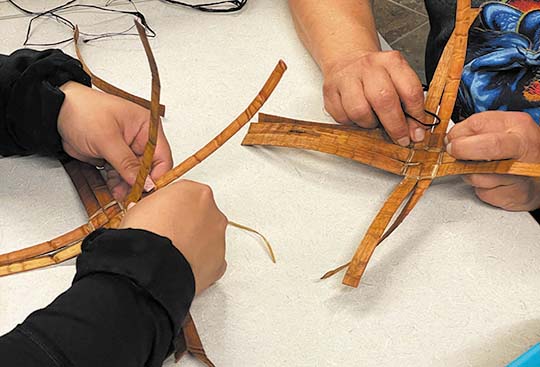
By Shaelyn Hood, Tulalip News
Every Wednesday, the Hibulb Cultural Center holds a Weaving Gathering from 5-7 PM. It is an open forum for those who are wanting to learn new weaving skills or work on their current projects. It is a time to visit with loved ones, share your works, and learn from community leaders. For any first timers, there are also weaving kits available for purchase.
Basket weaving and various other cedar crafts is a big part of Native American culture and is one of the oldest arts in the Pacific Northwest. There are different styles of basket weaving, plaiting, twining, and coiling. Each basket and craft serve a purpose, whether to be used for storage, for holding food, rinsing items, or carrying large loads.
Materials for weaving like cedar bark, spruce roots, and various types of grasses are are harvested throughout the year, then processed and dried for future use. Sometimes during the process, the materials are naturally dyed to add a pop of color. When the weaver feels like the material is ready, the cedar is rewetted so it can become more pliable.
For some weavers, basket weaving acts as a source of income. For others, it acts as a gift giving method for their family and friends. In any situation, basket weavers hold a high status in our community, just as they did centuries ago.
The September 22nd class was held by Jamie Sheldon, and other members of her family will be guiding future classes.
The Weaving Gatherings at HCC help preserve an artform that can be passed on to our loved ones and promote Native culture. For more information about the next Weaving Gathering, follow the events calendar at HibulbCulturalCenter.org, or call 360-716-2600.
BYOB: Bring Your Own Bag – State enforces single-use plastic bag ban
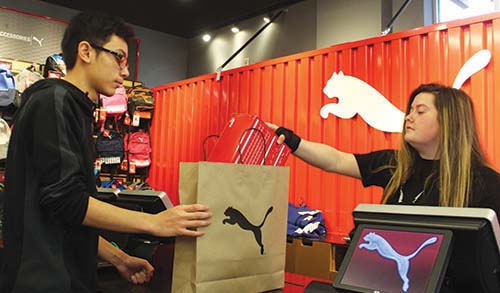
By Kalvin Valdillez, Tulalip News
Restaurants, retailers and grocers across the state of Washington will have to cease all distribution of single-use plastic bags, effective Friday October 1. In an effort to reduce the pollution of Mother Earth, and more locally the Salish Sea, the state has outlawed one of the main culprits causing harm to the environment.
Plastic carryout bags are handed-out at a high-frequency on the daily. According to the Center for Biological Diversity, the average American household accrues over 1,500 plastic bags annually and recycles less than one percent of those bags. The bags were created for the convenience of the shopper, intended to be utilized to transport your goods and purchases home safely. However, they are causing irrevocable damage to the natural world, especially aquatic life as over 100,000 marine animals are killed from plastic bags and plastic toxins each year.
Single-use plastic bags are non-biodegradable and take hundreds of years to break down into micro-plastics, which ultimately finds its way to the waterways and are consumed by sea-life, and in-turn often consumed by the human population. According to a study performed by the non-profit organization, Plastic Oceans, 100% of the mussels that they tested were contaminated with micro-plastics. Plastic Oceans also estimates that the average person eats over forty pounds of plastic throughout their lifetime due to the pollution caused by plastic bags.
Single-use plastics are produced by fossil fuels. The process of creating the bags alone emits an enormous amount of greenhouse gasses. In the Pacific Northwest, we are already beginning to see the link between plastic pollution, the food chain and climate change, especially when considering our depleted salmon and orca populations. It is estimated that by the year 2050, there will be more plastic in the ocean than there are fish. And as the plastic, and all the chemicals and toxins they contain, makes its way back up the food chain, it can start to create major health concerns for humans including hormonal imbalances, reproductive issues and in extreme cases, cancer.
The ban was originally supposed to go into effect at the start of 2021, but due to supply chain issues caused by the global pandemic, the ban was pushed back to October 1. Stores and eateries will be required to offer either paper bags or 2.25 mil thick-film reusable plastic bags – made with 20% recycled material, at a cost of eight cents per bag. Green or brown compostable bags are also an alternative and the fee for those bags are optional and at the business’ discretion.
Although this is a big change that consumers will have to get used to, many Washingtonians are already familiarized with a sans-plastic-bag-lifestyle. Nearly forty cities throughout the state have already implemented their own single-use plastic bag ban ordinance over recent years, including Quil Ceda Village on the Tulalip reservation.
Quil Ceda Village is home to a number of businesses and restaurants including the Tulalip Resort Casino, Tulalip Bingo, Walmart, Cabela’s, Home Depot and the Seattle Premium Outlets. When the city first implemented the plastic bag ban, they received little pushback and a surprising amount of support. With over 130 retail stores, the outlet mall phased out all of their plastic bags in 2017. In 2018, when the ban went into effect, most stores switched from plastic to paper and some stores even elected to stop offering bags completely.
“Overall the [plastic bag ban] is going well,” said Quil Ceda Village General Manager, Martin Napeahi. “The only issues I think we have had are from the consumer. Change in habits is tough for anyone, myself included, but I think consumers have adjusted and now bring their own reusable bags when they shop. Generally speaking, all of our retailers are following the ban. Stores like Cabela’s and Walmart offer reusable bags for a cost and Home Depot offers brown bags.”
Like Quil Ceda Village, neglecting to follow the statewide ban comes with a price tag and businesses that continue offering single-use plastic bags can be fined up to $250 per day. If you’re looking to avoid the 8¢-fee per bag, remember to BYOB on all of your shopping excursions beginning October 1. For additional information on the statewide ban, please visit www.ecology.wa.gov/bagban.
October 2, 2021 syəcəb
COVID-19 Case Update, Sept. 29
Potential life-saving treatment for COVID-positives available at Tulalip Health Clinic
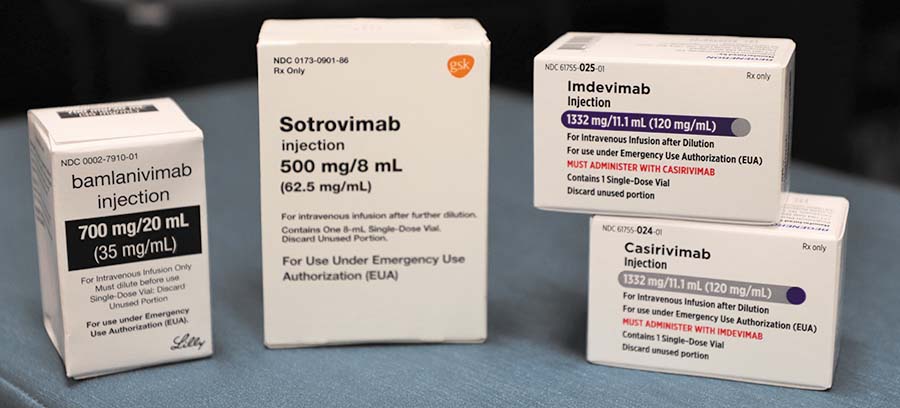
By Micheal Rios, Tulalip News
As COVID deaths continue to spike in Washington State — the 7-day average for deaths has reached its highest sustained peak all pandemic — newly developed treatments for the disease are beginning to receive global attention. Monoclonal antibody therapies are among the most effective. In this treatment, COVID-positive patients are infused with high concentrations of antibodies specifically designed to fight SARS-CoV-2, the virus that causes COVID.
On the Tulalip Reservation, a recent explosion of positive test results has corresponded with the return of in-person schooling and a number of large gatherings (birthday parties, funerals and community activities) Probable positives reached the triple digits in mid-September and yet another elder was a suspected pandemic casualty, bringing the total to 9 elders lost according to Emergency Management.
With the pandemic clearly not ending any time soon and many more COVID-positives a forgone conclusion at this point, the new interim Medical Director of Tulalip’s Health Clinic, Dr. Elizabeth TopSky (Chippewa Cree) has brought monoclonal antibodies to the reservation. She wants all eligible patients of the Health Clinic to know about this potentially life-saving treatment.
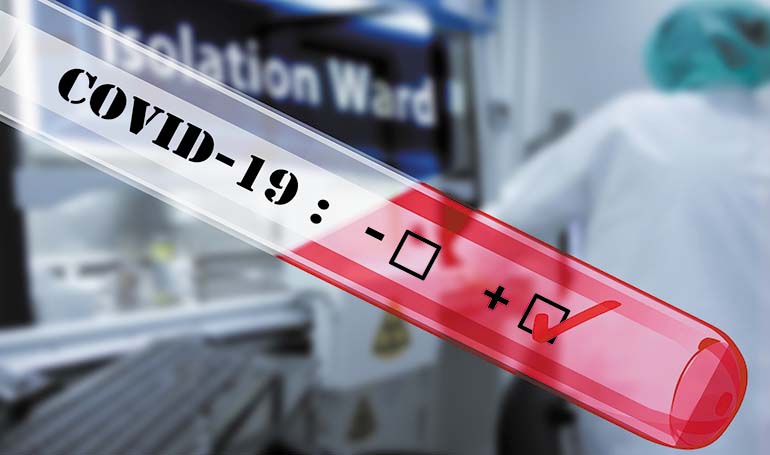
It is important to note this therapy is only available to those who have recently tested positive, and it can be administered to individuals as young as 12-years-old. Since mid-September the antibody treatment has been administered to multiple Tulalip elders and high-risk teenagers alike. The results have been overwhelmingly favorable.
One such elder, 81-year-old Keeta Sheldon, shared her experience with the antibody therapy. “Well, I was vaccinated so when I tested positive that was a bit of a surprise. My family reached out to local medical centers inquiring about this new antibody infusion and when they found out it was offered at our Health Clinic, they made the necessary arrangements,” she said. “The treatment only took 20 minutes and I felt pretty good right away.”
When asked if she’d recommend the monoclonal antibody treatment to her fellow tribal members, Keeta responded emphatically, “Yes. For those who catch COVID it’ll make them feel a whole lot better.”
Tulalip Health Clinic director Dr. TopSky was gracious enough to answer a few prevailing questions our readers may find insightful in regards to this breakthrough medicine intended to prevent severe symptoms and possible death from developing among our community’s most vulnerable.
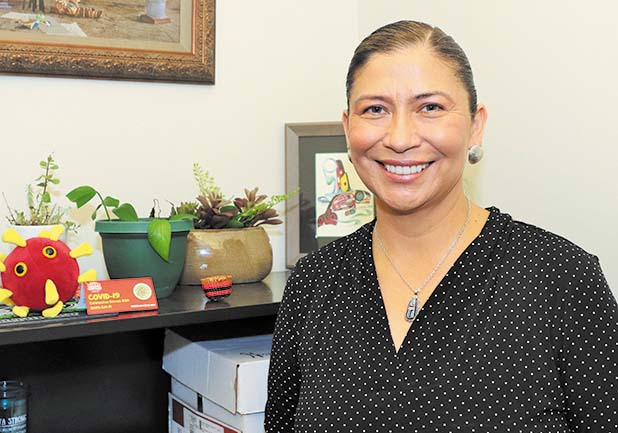
What is monoclonal antibody therapy?
Dr. TopSky: Monoclonal antibodies are laboratory-made proteins that bind to the spike protein of SARS-CoV-2 and block the virus’ attachment and entry into human cells. The product is available for the treatment of mild to moderate COVID-19 in adult and pediatric patients (over 12-years-old and weighing over 40 kg) who are at high risk for progressing to severe COVID-19 and/or hospitalization.
How is this therapy relevant in today’s current climate with the Delta variant running rampant in our community?
Dr. TopSky: Unfortunately, we have a fairly large population that is unvaccinated and we are dealing with the largest ever number of positive patients during this Delta surge. The vaccine is the first line in healthcare worker’s fight against negative outcomes from this infection. This therapy is a second option for our eligible patients to prevent hospitalizations and other complications. As a healthcare clinic, we are also able to help the local hospitals and ERs in this surge by providing this treatment to our eligible patients.
Who is eligible to receive this therapy at our Health Clinic?
Dr. TopSky: We are presently offering this therapy to eligible patients of our clinic when we are first aware they have tested positive. This is a collaboration from our medical staff and the Community Health Nurses. They have the information on community members who test positive outside of our clinic and forward to us. We review the list of positive patients to determine if they meet the criteria for the antibody infusion. We reach out to these patients at risk with a phone call.
If they voice interest, we then schedule an appointment for the infusion. Ideally, the infusion occurs as early as possible in the infection and needs to be completed in the first ten days of symptoms. The clinical worsening happens around 14 days and it can be difficult to predict who will worsen at that time. That’s why the guidelines are in place for who is eligible to receive the infusion.
To date, how many patients have received the antibody therapy at the Health Clinic?
Dr. TopSky: As of today, we have provided twelve treatments to our clinic patients, some of whom are not Tulalip tribal members. We will continue to monitor our positive patients and reach out to them by phone. We would definitely encourage any of our patients who test positive to reach out to us if they want to know if they meet the criteria.
We continue to improve our processes and we might not always be aware of a patient’s recent diagnosis. Howard Johnson, PharmD has been our primary contact for scheduling and providing this service. It does take 2-3 hours to complete and can be tiring sometimes for the patient when they are already not feeling well.
Any other pertinent information you’d like to share?
Dr. TopSky: Our medical providers and nursing staff, like all other healthcare providers in the country, are significantly overwhelmed with the present Delta surge. I would like to recognize them for their service to our patient population. They are exposed daily to this deadly virus and their dedication and service should not go unrecognized.
Also, we encourage everyone to get vaccinated when able as this is the first step in getting this pandemic under control. We are all in this together and getting vaccinated protects our families and community.
For more information about monoclonal antibody therapy and patient eligibility, please contact Tulalip’s clinical pharmacist Dr. Howard Johnson. He can be reached at (360) 716-5699
A tribal counselor’s life through recovery and powerlifting
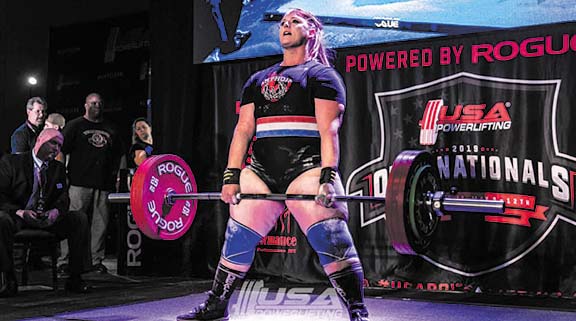
By Shaelyn Hood; photos courtesy of Andrea Page
Andrea Page is a recovering addict, counselor, powerlifter, student, and mother. 21 years ago, had you asked her if she could imagine herself today, she’d say, “No way”. At a time when she was struggling with her addiction and facing her biggest fear of the possibility of losing her children, Page made a choice and said, “It’s time for me to step up and do what I need to do, to try to be there for my kids”.
While living in Seattle, she sought out treatment and began her recovery journey. It was only then, through hard work and a strong support system, that she was able to turn her life around. She connected with many people who were on the same path of recovery who helped her begin a new and healthier future.
In 2010, Page made the decision to become a substance use disorder counselor. She felt that having been through the recovery process herself, that it could better help others, “It allows people to have that connection with somebody that understands, but also, I appreciate the community, being able to see how much support people can get from this community and how much change people can bring to the community in a good way”.
Eventually she took her skillset and started working for Tulalip Tribes in Family Services.
In 2011, shortly after starting her new career path, her friends who are also in recovery, introduced her to powerlifting. This new chapter in her life opened many new opportunities. She gave a lot of credit in her recovery to her support system, saying, “The thing that has helped me in my journey and recovery is not only having people that are also in recovery around me and doing things that are productive, but also my power lifting. I think a lot of that plays into my recovery too”.
Page is a part of the USA Powerlifting League that is widely known for their drug-free competitions. The USAPL promotes a clean, anti-drug, powerlifting environment, and requires drug testing before every competition. Page never imagined herself power lifting, and for a long time in her life had a hard time committing to outside activities. Power lifting gave her an outlet in her recovery and a way to show her strength in a way that’s more than just physical.
“I feel like I’ve been empowered by going to competitions. This is the one thing that has kept me focused, and driven, and it’s exciting to me”, she said.
Page also discussed how being a part of a team has given her more of a community and kept her motivated because she now had people that she needed to help and support. It has given her a sense of obligation to always show up.
Since her powerlifting journey started, she has won major titles such as, Master World Champion, 4x National Champion, she won the Best Female Master Lifter Award at Nationals in 2019, and the Washington State Athlete of the Year in 2018. Her Best Lifts include a 565lb squat, 325lb bench press, and 457lb dead lift. Her friends and family have become her biggest cheerleaders, by coming to her practices, competitions, and making jokes calling her “Squatzilla”. She’s also had opportunities to travel to Sweden, South Africa, and all over the US.
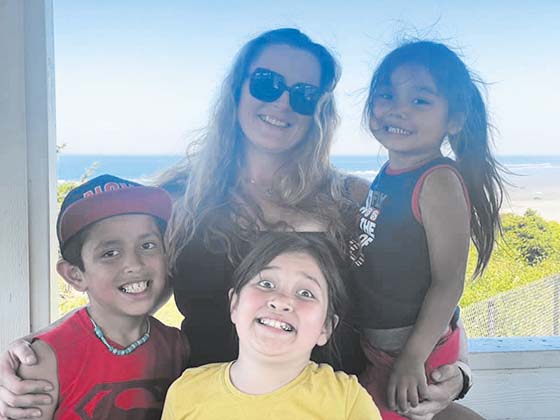
Through powerlifting and her new position in Family Services, she could see first-hand the need for assisting tribal children in finding new homes and potential adoption opportunities. At first, she thought about just doing respite care, and she would help take in children for a weekend here or there. But with more time, her love continued to grow for them. Soon after, the kids she had taken in were up for guardianship. She spoke with her family, and her new family unfolded. Page now has guardianship over three tribal children and feels so blessed to be a part of their lives.
One message that Page made very clear is that even though it might seem like she has achieved a lot, she’s just living her life, and she couldn’t have done it on her own.
“It was a lot of hard work, a lot of bumps in the road, which a lot of people in recovery experience,” said Page. “I can sit here and say I’ve accomplished this, this, and this, but if I didn’t have my support system around me, and the people who checked in on me, I wouldn’t have been able to do it”.
She also recommends to any tribal members that might be facing addiction, “just keep trying and find that support that’s going to help you achieve whatever it is you’re wanting to do. And no matter what, just keep pursuing your goals. Don’t give up. Even when things seem like they’re not working for you, or it just seems impossible, you have to put one foot in front of the other and keep trying, and always reach for those goals because eventually things will get better.”
She suggests that the first steps are to call family services and get in for an assessment. And for any members that have family struggling with addiction, “Be there for them. Don’t enable, just support them and get them help”.
If you, or someone you know is struggling with addiction, please contact Tulalip Tribes Behavioral Health at 360-716-4400.
September 25, 2021 syəcəb
Healing from within: Local Group aims to bring Recovery Café to Tulalip-Marysville area
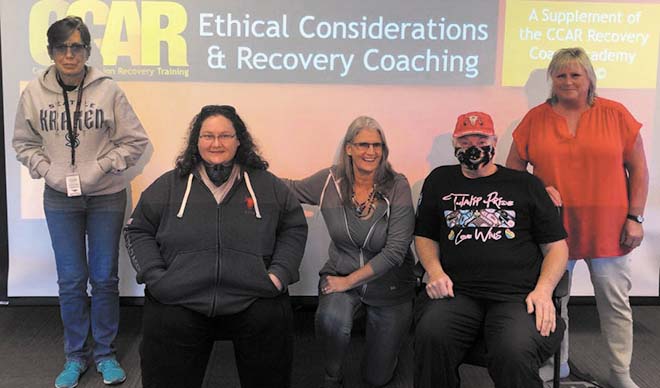
Gambling Program and taught by Whaakadup and Lisa Monger.
By Kalvin Valdillez, Tulalip News
Back in 2020, just weeks before the worldwide COVID-19 outbreak, the Tulalip Problem Gambling Program held a four-day training, over the course of two weekends, designed to build a network of support for local individuals on the road to recovery. Approximately twenty people attended the training and became certified recovery coaches, learning skills to help empower and encourage those battling addiction to stay the course, especially during difficult times when they are on the verge of a relapse.
“A recovery coach is someone in-between a sponsor and a counselor,” explained Problem Gambling Counselor, Robin Johnson. “They’re not there to tell them what to do. They are not doing the twelve steps with them, that’s not what they’re there for. They’re there to help, depending on their individual needs, finding out what those needs are, and meeting them there.”
She continued, “This is not the first recovery coach training that we’ve had, but it was by far the most successful. We’ve had better response and incorporated not only addiction, or chemical addiction, but also gambling addictions. Our philosophy is that we help the community heal from within, and the more people that we can teach to be recovery coaches, and have them in the community and available to others, that is just going to snowball. That was our hope and that is actually what seems to be happening at the moment.”
Through the recovery coach training, the Problem Gambling program planted a seed that is coming to fruition today. Six of those recovery coaches stayed in contact throughout the pandemic’s stay-at-home mandates, meeting virtually to discuss how they can spread the word and let those in recovery know they are available as a source of support, brainstorming ideas on how they can better serve their community. Ultimately, the group decided they needed a physical space where recovering addicts can go in times of distress and when in need of support, and with that came the idea of opening up a local Recovery Café.
The original Recovery Café was established in 2004 right here in the Pacific Northwest, in the Belltown neighborhood before migrating to South Lake Union in 2010. Since then, the Recovery Café has assisted not only those wanting to lead a clean and sober lifestyle, but also the homeless population in Seattle as well.
The café offers a positive environment where people can enjoy coffee and healthy meals while interacting with others in a number of activities including open mic nights and birthday celebrations. Café goers can take part in peer-to-peer groups such as recovery circles and they also have access to computers, WIFI and a plethora of resources. The Recovery Café model has been such a success that over 20 non-profit organizations have opened cafés of their own in cities throughout the country. And recently, a second location was opened in Seattle’s SODO district.
Although there is an established Recovery Café in Everett, opening a location in the Tulalip-Marysville area will benefit a community that has been significantly impacted by the opioid crisis over the years. This establishment could not come at a better time either as early projections predict that overdose cases and excessive gambling cases have been on the rise since the first wave of the pandemic hit. Offering a space where people can go to simply be around others who strive for the same goal can help during the recovery journey.
Still in the early planning phase, led by those six individuals who attended the Problem Gambling’s recovery coach training in 2020, the group is working on establishing a board of directors, designing a logo, raising funds and most importantly finding a space to set up shop. Ideally, the group would like the café to be in an area that is convenient and accessible to both Tulalip and Marysville community members. If you happen to be reading this and the perfect location comes to mind, the group would love to hear from you.
The recovery coaches also enlisted a number of professionals to help navigate the process of opening up the café, including Tulalip Tribal Prosecutor Brian Kilgore, Tulalip Recovery Liaison Helen Gobin-Henson, Tulalip ODMAP Social Worker Jackson Nahpi, and Robin Johnson and Sarah Sense-Wilson of the Problem Gambling program. The Tulalip Foundation has also leant their expertise to the project, helping the Café become a non-profit organization and apply for and obtain grants.
“I’m really excited about this group of people,” said Brian. “I think that they’re going to go out into the community and they’re going to create a physical space where people can come in and get wraparound support and services. I think that the power of having a physical place, around which to build services, is going to be really transformative for all the work we’re doing. Government, non-government, volunteers, we’re all working the same problem, right? We’re trying to save lives, trying to get parents back to their kids and rebuild families and communities and stop people from dying, but we just haven’t had a physical place to do it.”
Once the group finds a space to operate, they believe everything should easily fall in place, and they are aiming to have the café up and running by the end of the year. In addition to finding a space for the Café, the recovery coaches will be doing community outreach over the next couple months. If you are interested in helping get this project started and helping people maintain a clean and healthy lifestyle, please contact the Problem Gambling program at (360) 716-4304 for more information.
Helen expressed, “This project is important because we have nowhere for our people who are sober and clean, or want to get sober and clean, to gather. And we have so many people who are homeless, who are hungry, and they could come to the café and enjoy a meal. I feel like when the people who are sober and clean get together as a group, they can connect with each other and say, ‘Are you going to an in-person meeting today? I’d like to go with you’, or ‘what Zoom meetings are you hitting?’ They can connect there at the café. This is so important to me, to help the people who are sober, and encourage the people who might be thinking about getting sober and clean, find a safe and supportive place to gather.”
